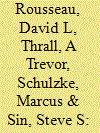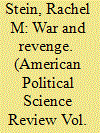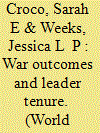| Srl | Item |
| 1 |
ID:
114155


|
|
|
|
|
| Publication |
2012.
|
| Summary/Abstract |
Despite strong empirical evidence for democratic peace theory, the historical record indicates that democracies have been involved in many wars. This article conducts a critical examination of how democratic polities become entangled in international conflict. The examination focuses on how democratic leaders manage domestic politics and public opinion at each stage of the conflict (i.e. disputes, crises, wars and settlement). The study explores how democracies are drawn into conflict; when democracies provoke conflict; what claims democratic leaders make to justify conflict; when domestic audiences support or oppose conflict; and the implications for democratic leaders after conflicts. It argues that democratic leaders pursue various strategies that are shaped by the stage of the conflict, the domestic institutional structure and the level of mobilised domestic opposition.
|
|
|
|
|
|
|
|
|
|
|
|
|
|
|
|
| 2 |
ID:
140812


|
|
|
|
|
| Summary/Abstract |
While we know much about what differentiates the conflict behavior of democracies from autocracies, we know relatively little about why some democracies are more belligerent than others. In contrast to existing studies, I argue that it is public opinion and not institutions that drives these differences. All democratic leaders have an incentive to take public opinion into account, but public opinion is not the same everywhere. Individuals’ attitudes towards war are shaped by core beliefs about revenge, which vary across countries. Leaders with more vengeful populations will be more likely to initiate conflicts because they generate popular support for war more effectively. Using retention of capital punishment as a proxy for broad endorsement of revenge, I find that democracies that have retained the death penalty for longer periods of time are significantly more likely to initiate conflicts. This research has important implications for existing theories of democracy and war.
|
|
|
|
|
|
|
|
|
|
|
|
|
|
|
|
| 3 |
ID:
149516


|
|
|
|
|
| Summary/Abstract |
A growing body of literature argues that war outcomes affect leaders’ tenure in office. But disagreement persists over how domestic political institutions translate performance in war into leader accountability. Some scholars argue that the tenure of democratic leaders is most sensitive to war outcomes, while others posit that autocratic leaders are more likely to be punished or rewarded for the outcomes of conflicts. The authors argue that existing research fails to take into account two important factors: whether the leader is viewed as culpable for the country's entry into the conflict, and whether the country features domestic institutions that make the leader vulnerable to removal from office, which varies greatly across nondemocracies. After taking leaders’ culpability and vulnerability into account, the authors show that the tenures of culpable, democratic leaders and culpable, vulnerable, nondemocratic leaders are sensitive to war outcomes. By contrast, the tenures of nondemocratic leaders who are less vulnerable to removal are not sensitive to war outcomes, regardless of their culpability.
|
|
|
|
|
|
|
|
|
|
|
|
|
|
|
|